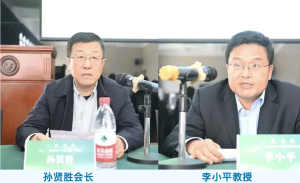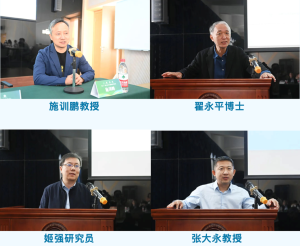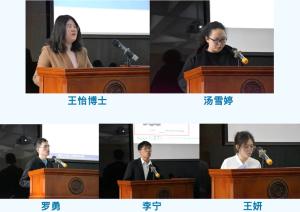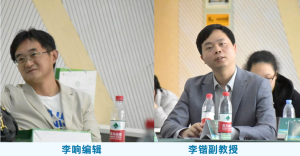
The Eleventh ISETS Energy Transition Forum
Exploring the Frontiers of Corporate Energy Transition
28 April 2023,Hubei China
The conference is co-organized by International Society For Energy Transition Studies (ISETS), the Collaborative Innovation Center for Carbon Emissions Trading, the School of Low Carbon Economy of Hubei University of Economics, and the School of Economics of Zhongnan Univ ersity of Economics and Law, and co-organized by the Energy Finance Alliance of ISETS and the Climate Finance Research Branch of Chinese Society of Optimization, Overall Planning and Economic Mathematics, and hosted by the Collaborative Innovation Center for Carbon Emissions Trading. The theme of the conference is “Exploring the Frontiers of Corporate Energy Transition”. There were opening ceremony, keynote speech and youth forum. Speakers from ISETS, Tencent, 21st Century Business Herald, University of Technology Sydney, Chinese Academy of Sciences, Southwest University of Finance and Economics, Wuhan University, Huazhong University of Science and Technology, Tongji University, Duke Kunshan University, Fudan University, The Hang Seng University of Hong Kong, Central South University of Economics and Law, China University of Mining and Technology, Henan University, Henan University of Economics and Law, Nanjing University of Aeronautics and Astronautics, Hubei University, Hubei University of Economics, Environmental Economics Research, etc. College, Environmental Economics Research and other universities, enterprises, research institutions and academic journals and newspapers, experts, scholars and postgraduates participated in the conference and exchange.
The opening session was chaired by Prof. Yan Fei, Dean of the School of Low Carbon Economy, Hubei University of Economics and Technology and Executive Vice Director of the Co-operative Innovation Center for Carbon Emission Trading, with welcome speeches by Prof. Lu Xiaocheng, Vice President of Hubei University of Economics and Technology, Dr. Sun Xiansheng, President of ISETS, and Prof. Li Xiaoping, Dean of the School of Economics, Central South University of Economics and Law.


Prof. Lu Xiaocheng believes that ISETS has been committed to promoting the transition of energy and its related industries to a fair, just and inclusive low-carbon future since its establishment, and has made unique contributions to the global energy transition, whose objectives are highly compatible with the objectives and research of the Provincial and Ministerial Collaborative Innovation Center for Carbon Emissions Trading and the School of Low Carbon Economy of our university, and this Energy Transition Forum invites experts from all walks of life to gather in Wuhan The current Energy Transition Forum invites experts from all walks of life to gather in Wuhan to discuss the frontier issues of energy transition of enterprises and offer suggestions for energy transition and carbon neutral strategies, which will surely achieve rich results. On behalf of ISETS, President Sun Xiansheng expressed his warm congratulations on the convening of this forum, saying that the end of the epidemic, the Russia-Ukraine conflict, climate change and other major events intertwined with the energy transition will have a great impact on the political culture of the world, especially the energy market prices. The EU carbon border adjustment mechanism was voted in the European Parliament and will be gradually rolled out in 2026, which will have a huge impact on our exporters. This forum is to promote scientific research on realistic and urgent issues in such a big context, and at the same time help enterprises to better grasp the initiative. Professor Li Xiaoping said that China is carrying out a series of practical work to achieve the goal of “double carbon”, and has taken energy transition as an important grasp to achieve high-quality economic development in the new development stage, how to promote the energy transition of enterprises has become an important topic in the field of carbon neutrality. We are looking forward to the insights, wisdom and solutions from experts and scholars in this issue of Energy Transition Forum.
- The keynote presentation session
The keynote presentation session was hosted by Shi Xunpeng, Professor of Energy and Economics and Sustainable Development at the University of Technology Sydney, Visiting Fellow of the Provincial-Ministry Collaborative Centre for Carbon Emissions Trading, and President of ISETS. Zhai Yongping, senior consultant of Tencent Carbon Neutral and former chief engineer of Asian Development Bank, Ji Qiang, researcher of Institute of System Analysis and Management, Institute of Science and Technology Strategic Consulting, Chinese Academy of Sciences, and Zhang Dayong, professor of Institute of Economics and Management, Southwest University of Finance and Economics, made presentations respectively.

Dr. Zhai Yongping introduced the “impossible triangle” of energy system: climate and environment, security of supply, economic and practical, and proposed that digital technology is the key to unlock the “impossible triangle” of energy. He introduced the “impossible triangle” of the energy system: climate environment, security of supply, and economic efficiency. He elaborated on the role of Internet technology majors in helping to upgrade energy digitally and intelligently, and proposed that digital technology can help achieve the 14th Five-Year Plan and 2035 energy goals from the CBS strategic positioning, i.e., leading consumers to green lifestyles (Consumers), helping industries to transform to low-carbon (Business), and promoting sustainable social value. Business), and promote sustainable social value and technological innovation (Society).
Ji Qiang, a researcher on the topic of “Climate Risk and Financial Markets”, said that the uncertainty of climate crisis is increasing and has become the biggest uncertainty factor affecting social stability and economic system security. The impact of climate risk on the financial system is increasingly becoming a new hot spot in the field of climate finance, and many financial institutions at home and abroad are trying to incorporate environmental and climate risks into their financial risk management systems. In the medium and long term, the negative impact of climate risk on China’s financial market is gradually increasing and will spread from local to global impact, which will easily lead to systemic risk in the industry, and it is of great practical guidance to analyze the impact of climate risk on China’s financial market.
The theme of Prof. Zhang Dayong’s report is “Climate Change and Governance Mechanisms”, he said that coping with the climate crisis will become the focus of future development in China and the world, in which achieving “carbon neutrality” has become the core proposition. In this process, the green and low-carbon transformation of enterprises is of great significance. He elaborated the significance of the external institutional environment and the internal environment of enterprises for green transformation, and proposed the influencing factors of enterprises’ actions to cope with the climate crisis, the interaction between the external institutional environment and internal governance mechanisms, and the logical basis and basic theoretical framework of the ESG system, attracting scholars to further discuss together in the climate field through different perspectives.
- The Energy Transition Youth Forum I
The Energy Transition Youth Forum I was moderated by Cui Jingbo, Associate Professor of Applied Economics, School of Social Sciences, Duke Kunshan University, with academic presentations by Zhang Jihong, Associate Professor, School of Macro-Quality Management, Wuhan University, Qian Haoqi, Associate Researcher, Institute of Global Public Policy, Fudan University, and Wang Xu, Associate Professor, School of Economics and Management, China University of Mining and Technology.
The topic of the presentation by Associate Professor Zhang Jihong is “Does Renewable Energy Consumption Reduce Carbon Emissions”,his study found that there is a threshold value for the impact of renewable energy consumption on regional electricity carbon emission intensity, and the threshold value for the proportion of renewable energy consumption in China to generate electricity-carbon market synergy emission reduction is much higher than that of OECD countries.
The presentation by Associate Researcher Haoqi Qian was titled “Structural Substitution Rather than Efficiency Improvement: the Heterogenous Policy Effects of China’s Pilot Carbon ETS”. He found that different units, different pilots, different institutional designs, and carbon prices have heterogeneous effects on the energy efficiency of generating units.
The topic of the presentation by Associate Professor Wang Xu was “How does carbon emissions trading scheme promote the governance of industrial overcapacity”, in which he used industry data to analyze and empirically study the mechanism of carbon market to eliminate backward production capacity and promote the governance of industrial overcapacity from two major paths: technological innovation and compliance cost.


In the discussion session of the keynote report and the academic report of the Youth Forum, Li Hong, editor of the 21st Century Business Herald, President Sun Xiansheng and the participants had a lively discussion on the report topics with the reporters.
- The Energy Transition Youth Forum II
The Energy Transition Youth Forum II was chaired by Professor Wang Keying, Vice President of the School of Low Carbon Economics, Hubei University of Economics. Five young teachers and graduate students, including Wang Yi, Lecturer of the School of Finance, Hubei University of Economics, Tang Xue Ting, Master’s student of the School of Business Administration, Zhongnan University of Economics and Law, Luo Yong, PhD student of the School of Business, Hubei University, Li Ning, Master’s student of the School of Power and Machinery, Wuhan University, and Wang Yan, Master’s student of the School of Economics and Management, China University of Mining and Technology, made academic presentations.
Dr. Yi Wang’s presentation titled “Dynamic Interactions of Oil Prices, Exchange Rates, and Stock Prices in China: A TVP-VAR Analysis of Asymmetric Connectedness” investigates the net risk asymmetric transmission mechanism of three variables: oil prices, exchange rates, and stock prices from both static and dynamic perspectives using a frontier approach.
Tang Xueting’s report, titled “How the Establishment of the Pilot Free Trade Zone Affects Corporate Green Innovation”, finds that the implementation of the FTZ policy has a positive and significant heterogeneous effect on the level of corporate green innovation, and the FTZ improves corporate green innovation mainly by increasing innovation performance, but the improvement of financing constraints and investment efficiency adversely affects the improvement of green innovation.
Luo Yong’s report, entitled “The Synergistic Effect of Environmental Justice on Reducing Pollution and Carbon,” found that the establishment of environmental courts has a significant synergistic effect on reducing pollution and carbon, and that the effect is more pronounced in areas with higher levels of legal environment, non-resource-based cities and areas with lower economic growth pressure.
Li Ning’s presentation, titled “Different Precisions Modeling Significantly Deviates the Carbon Accounting of Energy System”, found that different precision modeling leads to significant deviations in carbon accounting of energy systems.
Wang Yan’s report, titled “Study on the Existence, Influencing Factors and Economic Consequences of Cohort Effect of Green Technology Innovation in Enterprises”, found that the strength of cohort effect of green technology innovation promotes the environmental performance of enterprises, so enterprises should pay attention to the social interaction with industry cohorts, the industry should improve the information disclosure and guidance and supervision mechanism of external market organizations, and the government should make great efforts to reduce information noise and information acquisition costs.

President Sun Xiansheng, Editor Li Hong, Researcher Shi Xunpeng, Researcher Ji Qiang, Professor Zhang Dayong, Associate Professor Cui Jingbo, Associate Professor Wang Xu, Associate Professor Li Kingland of Wuhan University, Associate Professor Tsun Se Cheong of Hang Seng University, Hong Kong, and Dr. An Yunfei of Henan University and many other experts asked several questions to the reporting young teachers and students on the topic of the report, and gave them in-depth communication and guidance on the research theme, research significance, theoretical mechanism, model design, data processing, policy implications and many other aspects.

“ISETS Energy Transition Forum” aims to promote the transition of energy and its related industries to a fair, just and inclusive low-carbon future, inviting experts and scholars from home and abroad to discuss cutting-edge theoretical issues and policy practices in energy market, energy transition, climate risk and green development of enterprises. The participants cover universities, research institutes, government agencies and NGOs in China, the United States, the United Kingdom, Germany, Japan, Australia, Singapore and other countries, and has become an important academic exchange platform for exploring the theoretical and practical issues of energy markets in various countries, which has received wide attention from academia, industry and government departments.

